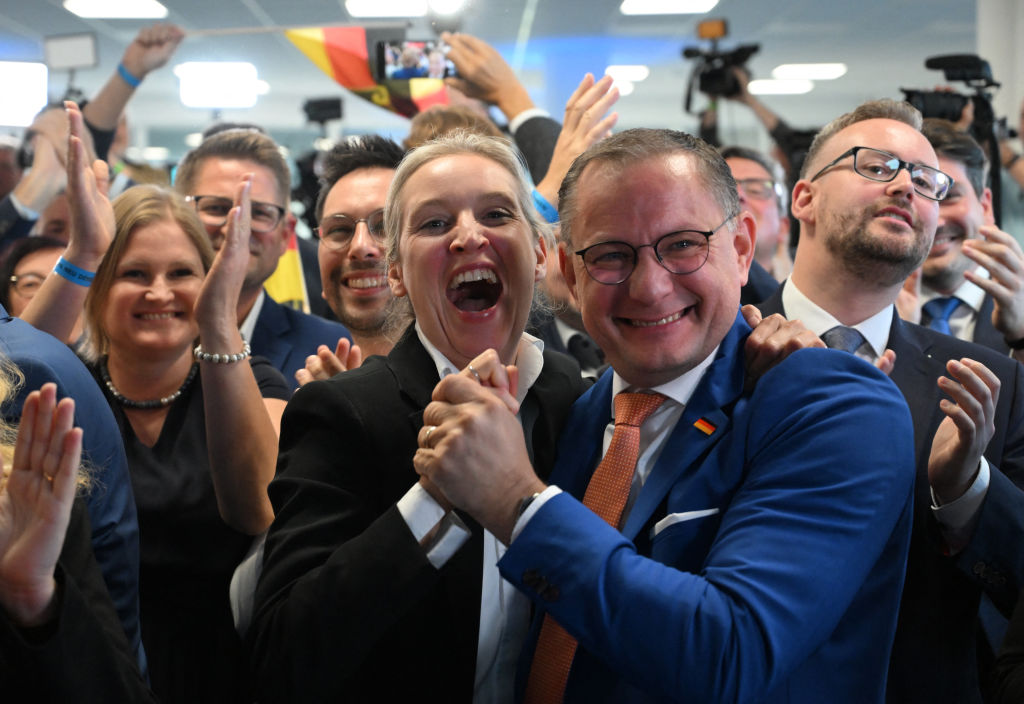Members of Germany’s traditional parties in Germany will not sleep well following the results of elections to the European Parliament. At the time of writing, every party within the governing traffic-light coalition lost votes. The Greens dropped significantly to 12%, having taken 20.5% of the vote in 2019. The Social Democrats “only” went down by a couple of percentage points, but their overall share of 14% was nonetheless their worst result in a federal election since 1887.
Even more worrisome for Olaf Scholz and co., however, are the underlying trends emerging from these elections. Although the conservative CDU/CSU alliance achieved first place with 30% of the vote, this was still somewhat disappointing given just how tired the population has become with the present government. CDU leader Friedrich Merz may not have lost votes, but his party’s vote share only went up by just over a percentage point, despite the members of the coalition government dropping a combined 11 points.
So where did those voters go? Some of them shifted to the Alternative for Germany (AfD), which went up by 5.2 points and came in second after the conservatives. Given the absolutely catastrophic final weeks before the election, this should not have been possible. The party’s top candidate Maximilian Krah had to suspend his campaign and the AfD was kicked out of the ID group in the European Parliament, due to comments he made about the Waffen-SS — and that’s before getting to the spying and corruption allegations. Yet voters were undeterred, demonstrating that the AfD now has a solid base of around 15% which is willing to vote for the party under almost any circumstances.
In fact, what really hurt the AfD was the appearance of the Alliance Sahra Wagenknecht (BSW), a party formed just this year by former members of the post-communist Die Linke. Wagenknecht is a charismatic politician who combines nostalgia for the former German Democratic Republic with a tough stance of migration and the rejection of continued aid for Ukraine. Although officially a party of the Left, on the issues that matter most for voters the BSW is almost indistinguishable from the AfD. Before the BSW appeared, the AfD polled at 22% — now the AfD is on 16% while Wagenknecht’s party has taken 6% of the vote. On certain issues in Germany, populism has begun to transcend the Left-Right paradigm.
Another, equally interesting trend shows that the Greens can no longer take the youth vote for granted. Among 16 to 24-year-olds the Greens went down a whopping 23 percentage points, reducing them to only 11% among the age group, while the AfD got 17% — an increase of 12 points — and the CDU/CSU went up five points to 17%.
Among Germany’s Generation Z, conservative parties are now the most popular, which also contradicts claims by analysts such as Peter Zeihan that it is only “crotchety” pensioners who vote for the Right. The AfD and the BSW demonstrate that the populist parties in Germany are not only gaining popularity, but are also conquering younger demographics no longer deterred by the constant invoking of a Nazi past which means increasingly less to them. The picture of the Right as a group of gnarly reactionaries born in the Forties is no longer accurate, and new parties are capitalising on this.
One can only imagine what the results would have been without such as self-destructive AfD campaign, but we will no doubt find out in 2025 when Germany has its next federal elections.











Join the discussion
Join like minded readers that support our journalism by becoming a paid subscriber
To join the discussion in the comments, become a paid subscriber.
Join like minded readers that support our journalism, read unlimited articles and enjoy other subscriber-only benefits.
Subscribe